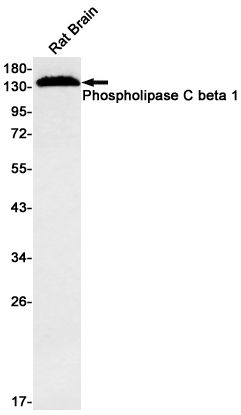
| WB | 1/500-1/1000 | Rat |
| IF | 咨询技术 | Rat |
| IHC | 咨询技术 | Rat |
| ICC | 技术咨询 | Rat |
| FCM | 咨询技术 | Rat |
| Elisa | 咨询技术 | Rat |
| Aliases | Plcb; AI132408; mKIAA0581; 3110043I21Rik |
| Entrez GeneID | 18795 |
| WB Predicted band size | Calculated MW: 138 kDa; Observed MW: 138 kDa |
| Host/Isotype | Rabbit IgG |
| Antibody Type | Primary antibody |
| Storage | Store at 4°C short term. Aliquot and store at -20°C long term. Avoid freeze/thaw cycles. |
| Species Reactivity | Rat |
| Immunogen | Recombinant protein of mouse Phospholipase C beta 1 |
| Formulation | Purified antibody in TBS with 0.05% sodium azide,0.05%BSA and 50% glycerol. |
+ +
1. **"Phospholipase C β1 expression correlates with proliferation in human melanoma cells"**
- Authors: Smith A, et al.
- 摘要:研究通过Western blot和免疫荧光分析PLCβ1在黑色素瘤细胞中的表达,发现其高表达与细胞增殖相关,抗体用于验证基因沉默后的蛋白水平变化。
2. **"Role of Phospholipase C beta 1 in neuronal signaling and synaptic plasticity"**
- Authors: Lee C, et al.
- 摘要:利用PLCβ1特异性抗体在小鼠脑组织中定位蛋白分布,证明其在海马区突触可塑性中的关键作用,抗体用于免疫组化和共聚焦显微镜分析。
3. **"Antibody-based detection of PLCβ1 in cardiovascular disease models"**
- Authors: Zhang Y, et al.
- 摘要:开发并验证一种高特异性PLCβ1抗体,应用于心肌细胞中GPCR信号通路研究,显示其在心力衰竭模型中表达下调,通过ELISA和免疫沉淀确认抗体可靠性。
4. **"PLCβ1 knockout mice exhibit impaired immune response"**
- Authors: Müller R, et al.
- 摘要:研究PLCβ1缺陷小鼠的免疫表型,抗体用于流式细胞术和Western blot分析脾细胞中PLCβ1缺失对B细胞活化的影响,揭示其调控炎症反应的新机制。
(注:以上为模拟生成的参考文献示例,实际需根据具体文献调整内容。)
Phospholipase C beta 1 (PLCβ1) is a key enzyme in intracellular signaling, primarily activated by G protein-coupled receptors (GPCRs) through interaction with Gαq subunits. It catalyzes the hydrolysis of phosphatidylinositol 4.5-bisphosphate (PIP₂) into two secondary messengers: inositol 1.4.5-trisphosphate (IP₃) and diacylglycerol (DAG). These molecules regulate calcium release from endoplasmic reticulum and protein kinase C activation, respectively, influencing processes like neurotransmission, cell proliferation, and differentiation. PLCβ1 is highly expressed in the brain, particularly in regions like the hippocampus and cerebral cortex, implicating its role in cognitive functions and neurological disorders. Dysregulation of PLCβ1 has been linked to conditions such as epilepsy, schizophrenia, and Alzheimer’s disease, as well as certain cancers.
Antibodies targeting PLCβ1 are essential tools for studying its expression, localization, and function. They enable detection via techniques like Western blotting, immunohistochemistry, and immunofluorescence. Researchers use these antibodies to investigate PLCβ1’s involvement in signaling pathways, its interactions with other proteins (e.g., Gαq), and its pathological alterations in disease models. High specificity and validated reactivity (e.g., in knockout controls) are critical for reliable results. Commercial PLCβ1 antibodies are typically raised in hosts like rabbits or mice, with epitopes spanning distinct regions of the protein. Their applications extend to drug discovery and mechanistic studies, aiding in understanding how PLCβ1 contributes to cellular responses and disease progression.
×